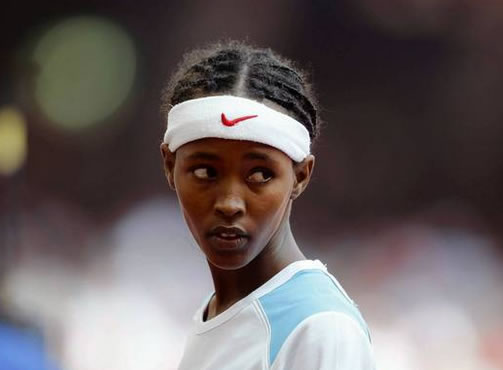
Wednesday, August 29, 2012
Samia Yusuf Omar was an Olympic runner whose dream was to go to Europe to train and earn money to support her family. But the dream ended with her boat journey.

Samia Yusuf Omar ran for Somalia at the 2008 Beijing Olympic Games. She drowned this year when the boat that she was taking to Italy ran into trouble at sea. (Kerim Okten/ European Pressphoto Agency / August 19, 2008)
By Lutfi Sheriff Mohammed and Robyn Dixon, Los Angeles Times
MOGADISHU, Somalia — When she was 17, Samia Yusuf Omar experienced a brief moment in the international spotlight when she ran a 200-meter race representing Somalia at the 2008 Beijing Olympic Games.
Omar finished far behind other sprinters in her qualifying heat, but as a female athlete competing in the Olympics for Somalia, a country known mainly for being a failed state, she made headlines.
She also got hooked on a dream: Omar wanted to train as a runner and compete internationally for her country, and to earn money to support her family. She was determined to get to Europe, where she hoped to find a trainer.
Several months ago, Omar boarded a boat in Libya that she hoped would take her to Italy. The day before, she called her mother, Dahabo Ali Egale. It turned out to be the last time Egale heard from her 21-year-old daughter, who drowned in April after the boat she was on apparently experienced mechanical problems.
Omar became one of the thousands of Africans who drown at sea each year chasing a dream: to get to Europe, make money and support their families.
When Omar came back from Beijing in 2008, the then-popular Shabab militia was fighting to repel Ethiopian invaders. Ethiopia's forces departed in 2009, leaving the Shabab, with its strict sharia, or Islamic law, in place. Women had to cover up, wearing long, dark flowing garments. The militia banned Somalis from watching sports or participating in sporting events. People who tried to train as runners or play soccer risked being arrested, beaten or even forcibly recruited into the militia.
The Shabab, which rapidly lost popularity, abandoned Mogadishu, the capital, but continued carrying out sporadic attacks.
Egale, who was widowed in 1991, had to eke out a living selling vegetables to support her seven children. But with clashes escalating in Mogadishu in 2009, she was unable to sell vegetables, and there was little money for the family.
"I had to stop my business and we missed out on food and Samia missed out on even her bus fare. So she decided to leave the country to try to get training," Egale, 51, said in an interview at her Mogadishu home.
"I remember she was saying, 'Mom, I want to earn money with my running,'" Egale said, tapping her leg for emphasis, tears running down her face.
In April 2011, Omar fled to Ethiopia in the hope of finding a trainer there. She later went to Libya, where she planned to take a boat to Europe. Egale tried to persuade her daughter not to go by boat.
"I advised her not to go by sea, but she insisted. I really believed she wouldn't have any problems, so I accepted her decision to travel by boat, and she did," Egale said.
In April, the night before the boat departed, Egale heard from Omar.
"She called me and said, 'Mom, I am going to Italy. It's a tough journey, but I will try my luck. Pray for me. I miss you, but we'll be reunited in Europe soon.' Those were her last words," said Egale, weeping.
There are conflicting reports about what happened to the boat's engine. Egale said the engine failed, while other reports say the boat ran out of gasoline. An Italian vessel came to the rescue and ropes were thrown to the people in the stricken boat, but seven drowned while trying to make it from one boat to the other. Omar was among those who did not make it.
Khadija Aden Dahir, senior vice president of the Somali Athletics Federation, said Omar's death was a huge loss for Somalia.
"She dedicated her life to winning at the Olympics. I still remember at the 2008 Beijing Olympics when her race ended in failure she was very upset and she refused to eat dinner that night. She believed that athletics was extremely important and she gave a lot of time and energy to it," said Dahir. "She always said that she wanted to win in the 2012 London Olympics."
Omar's death was reported this month after former runner Abdi Bile spoke of how Somalis were proud of this year's Olympic performance by Somali-born British runner Mohamed "Mo" Farah, but would never forget Omar.
"Samia died at sea and no one buried her body. She is missing at sea," Egale said. "She was dedicated to becoming one of the best Somali runners. Above all, that was her dream."
[email protected]
Special correspondent Mohammed reported from Mogadishu and Times staff writer Dixon reported from Johannesburg, South Africa.